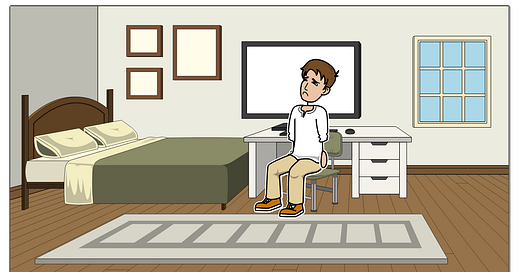My old job used to have this silly goodbye tradition whenever someone would leave.
On the outside, it was purely a email. And indeed, to the outsider, how much could a departure email really mean?
But at my company, if you worked there for any longer than a month, you knew. These emails were everything.
Sometimes stretching on over multiple pages, friends of mine had drafts of their emails in progress for months or even a year before they decided to leave the firm. The emails were contests of how many memories and inside jokes, memes and photos could be packed in. Long before even thinking about leaving I remember hilarious moments, deep connection with my colleagues, and wondering, will this make it in my email one day?
“Oh, dear C6WK,” I thought of writing, referring to a case team project code. “How the times have changed since our late night laughscapades. The abdominal pain I hoped would never end! Sara still isn’t a Benihana chef but hey, now that John has Glakowski-d his was onto H4WN let’s not pretend the cards are off the table…”
Opening a farewell email, usually sent to the whole office plus anyone else in the firm with whom you’d crossed paths, was a delight. These emails were never sad — really quite the opposite. They were like goody bags filled with unexpected treats, candies you hadn’t tasted in years. They’d often come in on a Friday, and I’d hold it in my inbox, saving it as an afternoon reward for getting through the day.
The farewell email was a perfect mid-career eulogy, a reminder of our impermanence. People came to the firm, moved up in the firm, and left the firm.
In many ways the email was a marker of time, a moment to pause. A reflection: yes, look at the years that have passed right beneath us, and look at how much life we’ve lived.
And so, when my time came, I looked on the email writing process as a special opportunity, a chance to tie up my experience and put a bow on it all. Freedom to move gracefully to my next.
But, as the story goes, the world changed in March 2020.
Some early leavers sent off their goodbyes, but as the months of the pandemic wore on, the emails gradually dried up.
With another offer in hand and only positive memories behind me, I sat down to write my email. It was August 2020.
I couldn’t do it.
I had lists of great memories, friends I’d picked up from all over the world, at trainings and offsites, at client meetings and social gatherings. The content was all there.
But the words would not form. The jokes were dull. I’d write one and think to myself, why are you kidding yourself thinking Amanda will think is funny, much less even remember this moment? Where even is Amanda?
I’d close up my laptop and try again later.
Of course, later never came. I told HR I as leaving, I saved my personal files to my Gmail, and shipped off my laptop, to some IT person, somewhere. I imagined that person opening it and seeing my draft email before wiping the whole thing clean. Of course that was a stupid fantasy, I remember thinking.
It’s now been nearly three years since I left that job, and I still think back to that email every now and then. How much I had to say, how much I wanted to share.
Instead, I wonder: where are all those people I loved so much?
Did they have similar experiences?
Are they thinking about me the way I’m thinking about them?
As it turns out, I’m not the only one who’s experienced these thoughts and feelings. Emerging research on work-from-home has come to show a reduction in both deep relationships and weak ties.
Much of that research is directed at answering employer questions: can we innovate, create, produce as much, as well as we did before?
Those questions are important — and certainly more to come on them later.
But today, writing this post, I’m left wondering: for the individual - does this matter?
Work from home has traded depth of connection at work for time and space to build a life outside of work. Thinking about my farewell draft makes me sad, even today. But is that sadness a letting go of an old time, relic-of-the-past type of sadness? Am I sad because change is hard and emotional, or sad because I disagree with the direction the world is headed in?
Many would say work was never meant to be the place to “bring your full self,” because if your self is tied up at work, what happens to your self when work ceases to meet your expectations?
More than 1 in 10 Americans experience depression, and I do believe that has something to do with work becoming the temple, the place of worship, for the masses. And maybe, just maybe, this detachment from connection at work is what we need to build real lives of our own, designed around our needs, not our bosses or colleagues.
Honestly, I’m not convinced.
Work is where we spend two-thirds of our waking hours. The idea of putting on a shell of myself for that much of my life feels…. wrong. Maybe I haven’t yet discovered what life outside of work could be. I haven’t had kids, and frankly I have never really experienced a strong “self” outside of work. So it’s hard for me to say, but at least right now, it feels like a tough pill to swallow.
What I can say is that whatever direction we are going in — whatever we decide is the ‘right’ level of connection at work — I sure hope we are intentional about it.





